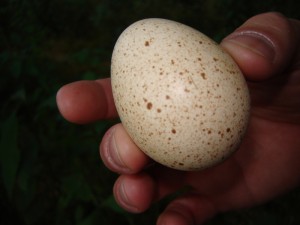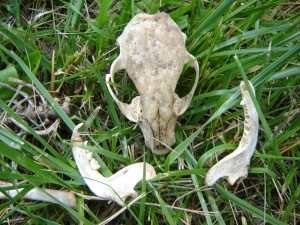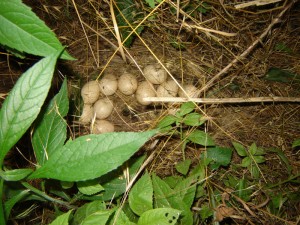So, I think every Heaney discussion should start with this poem. I’m probably the only one who does, but since I’m at the helm for the moment, I’ll continue on apace. Once upon a time, I gave a paper about his bog poems at an Irish Studies conference. I used slides of the bog bodies. They included a "don’t come to this talk if you’re squeamish" warning. It was a proud day for me, lemme tell you. I should find that paper and see if it was any good. And, er, sorry that these poems are gross. I think they’re gorgeous because, ultimately, they’re about pacifism and ancient European tribal culture, two of my favorite things. I’m the type of person who stares right at death and physiology and rot and finds all of the above fascinating and necessary.
Right, so. The poem:
The Tollund Man
- I
- Some day I will go to Aarhus
- To see his peat-brown head,
- The mild pods of his eye-lids,
- His pointed skin cap.
- In the flat country near by
- Where they dug him out,
- His last gruel of winter seeds
- Caked in his stomach,
- Naked except for
- The cap, noose and girdle,
- I will stand a long time.
- Bridegroom to the goddess,
- She tightened her torc on him
- And opened her fen,
- Those dark juices working
- Him to a saint’s kept body,
- Trove of the turfcutters’
- Honeycombed workings.
- Now his stained face
- Reposes at Aarhus.
- II
- I could risk blasphemy,
- Consecrate the cauldron bog
- Our holy ground and pray
- Him to make germinate
- The scattered, ambushed
- Flesh of labourers,
- Stockinged corpses
- Laid out in the farmyards,
- Tell-tale skin and teeth
- Flecking the sleepers
- Of four young brothers, trailed
- For miles along the lines.
- III
- Something of his sad freedom
- As he rode the tumbril
- Should come to me, driving,
- Saying the names
- Tollund, Grauballe, Nebelgard,
- Watching the pointing hands
- Of country people,
- Not knowing their tongue.
- Out here in Jutland
- In the old man-killing parishes
- I will feel lost,
- Unhappy and at home.
Heaney wrote this poem when the Troubles in Northern Ireland were really getting out of hand. P.V. Glob’s masterpiece had just been translated into English, and it was making a big impression on academics throughout Europe. Reading it, Heaney gave a lot of thought to sacrifice, violence, martyrdom, religion, exile, and all of the things that a brilliant Catholic writer who grew up in Northern Ireland was likely thinking about as his state exploded around him and many of his colleagues and compatriots were radicalized.
Bog bodies are one of those wonderful gifts to archeology that people like me geek about. For whatever reason, Northern European tribes in the ancient world buried a lot of people in bogs. And the wonders of cold temperatures, the tannins common in bog water, and the auspicious choice to inter these bodies at just the right time of year conspired together to preserve many bodies and thus teach us more about ancient religious practices and material culture, than, well, just about any other burial practice. A chemist couldn’t arrange a better scenario to make human remains last. Unlike Egyptian Mummies, most bog bodies retain their facial expressions. They retain skin and hair. Leather and cloth often last. Again, sorry if this is gross. People in Northern Europe have been finding preserved bodies in bogs for hundreds of years as they cut turf. Only in the last 120 or so years have we had any sense of how long some of these people people have been interred. Tollund Man, who was found by peat-cutters in Denmark, was one of the first to be properly dis-interred, studied, and preserved for the future. He’s the Danish King Tut. He’s a Rosetta Stone of sorts. He is cooler than Elvis.
Anyway, most of the bog bodies got there via human sacrifice, and many of the sacrificial victims suffered triple deaths. Tollund Man, for instance, was garroted, drowned, and bludgeoned. And he was clearly prepared for his death. He was given special food. He was wearing ritual clothing. He was pampered for a long time before his death. He probably knew what was coming, and he may even have volunteered for such a death. And that’s where Heaney sets his hook. Tollund Man is thought to have volunteered for martyrdom. His face truly looks peaceful. Heaney, of course, rejects the concept of voluntary martyrdom in the modern world. He refuses to glorify murder by naming it sacrifice.
The structure is important here. Heaney plays with religious beliefs and actions as the poem progresses. The first section is Heaney’s take on early quasi-peaceful polytheistic beliefs. Death is natural and arguably peaceful, even in violence. The victim is mild, and he is given to a lover who keeps him. The Earth is female, and sexual, and is a bride to a dead man. Catholicism peeks in with "saint’s kept body", but Heaney tries his hand at heathenism and finds a niche. The second section turns to violent imagery, blending Catholic concepts of prayer and martyrdom with witchcraft. Heaney questions whether he should pray to the Tollund Man as some sort of vengeance God, but ultimately refuses to do so. In the final section, Heaney abandons ritual and observes the tragedy of all of it, while imagining himself on a sort of parade of death, similar to Tollund Man’s last hours, driving towards the museum in Aarhus. Ultimately, Heaney rejects the concept of sacrifice, as have the vast majority of humans in the modern world. We know that killing a goat or a person won’t improve our crops or convince the Gods to smite our enemies. We know that dying to forward a political cause is useless.
Heaney wants no volunteer martyrs. He wants no hand in that twisted sense of suicidal violence overtaking both warring communities during the Troubles. He knows that, as a poet, he has the opportunity to recast the victims of violence in Northern Ireland as martyrs, and he refuses to do it. Unlike Tollund Man, who theoretically believed that his death would do some good for his people, Heaney refuses to argue that the death of those "four young brothers" served any purpose.
I first came across these poems before the first Gulf War, and they struck home because of their pacifist bent. Re-reading them now as the US truly learns what it feels like to both experience and commit acts of terrorism, I love them all the more.
Finally, Ireland and Denmark are linked, of course. It is generally accepted that the culture of Megalith builders who dotted Ireland and Britain with mounds and dolmens were the same people who raised brother monuments in continental Europe. As Indo-European cultures rose, Celtic tribes settled all over Europe and into Asia, settling in Denmark and Ireland. Tollund Man likely spoke either Proto-Celtic or one of its sister languages, which have grown into German and Danish and Swedish. As time passed and Celtic tribes faded on the continent, their influence held on in Scandinavia and in Britain and Ireland. The Danish and Norwegian Vikings who raided their cousins’ homes along the coasts of Britain and Ireland and founded towns like Dublin ended up bringing Christianity to Heaney’s land, and thus bringing the seeds of the Troubles.
It’s what we humans do. We give our grandchildren the means with which to destroy each other mixed in with the glories of humanity. We remain animals determined to kill or be killed. Heaney wants to break free of that curse, and so do I.
How is that for some light summer reading?





















